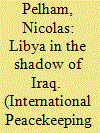|
|
|
Sort Order |
|
|
|
Items / Page
|
|
|
|
|
|
|
| Srl | Item |
| 1 |
ID:
121445


|
|
|
|
|
| Publication |
2012.
|
| Summary/Abstract |
This article traces the extraordinary development of Gaza's tunnel phenomenon over the past decade in response to Israel's economic asphyxiation of the small coastal enclave. It focuses on the period since Hamas's 2007 takeover of the Strip, which saw the industry's transformation from a clandestine, makeshift operation into a major commercial enterprise, regulated, taxed, and bureaucratized. In addition to describing the particulars of the tunnel complex, the article explores its impact on Gaza's socioeconomic hierarchy, strategic orientation, and Islamist rule. The larger geopolitical context, especially with regard to Israel, the Sinai Peninsula, and the Nile Valley, is also discussed. The author argues that contrary to the intentions of its architects, the siege precipitated the reconfiguration of Gaza's economy and enabled its rulers to circumvent the worst effects of the blockade.
|
|
|
|
|
|
|
|
|
|
|
|
|
|
|
|
| 2 |
ID:
115327


|
|
|
|
|
| Publication |
2012.
|
| Summary/Abstract |
In formulating its plans for government, the National Transitional Council (NTC), the political arm of the anti-Qaddafi uprising in 2011, was heavily guided by international thinking regarding the experience of de-Ba'athification in Iraq. In attempting to avoid 'reliving the Iraq war', the NTC, made a conscious decision to integrate the 'Old Guard' into the new order, but thereby created new challenges by alienating those who had led the rebellion. This Eyewitness is based on insights - from the author's interviews in Libya (particularly at the Second Congress of the rebel militias of April 2012), and argues that the fledgling central authority added to post-Qaddafi instability by failing to secure the buy-in of the rebel militias into their post-conflict vision of a civilian order, replete with elections. It concludes that in their zeal to correct the mistakes the West made in Iraq, Libya's new authorities may well have over compensated creating fresh obstacles to the country's stabilization and reconstruction.
|
|
|
|
|
|
|
|
|
|
|
|
|
|
|
|
|
|
|
|
|